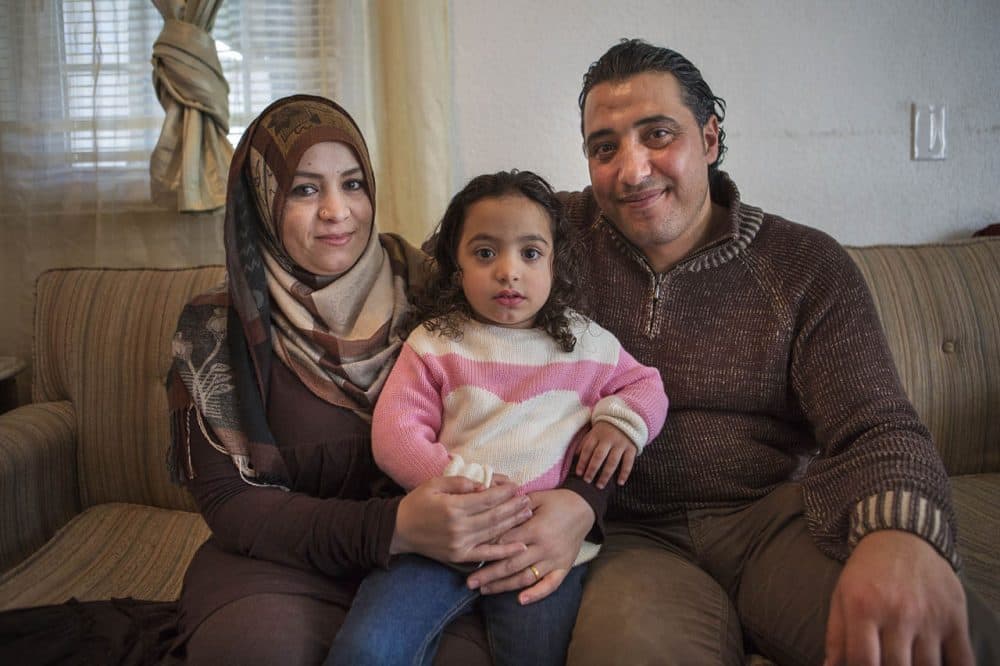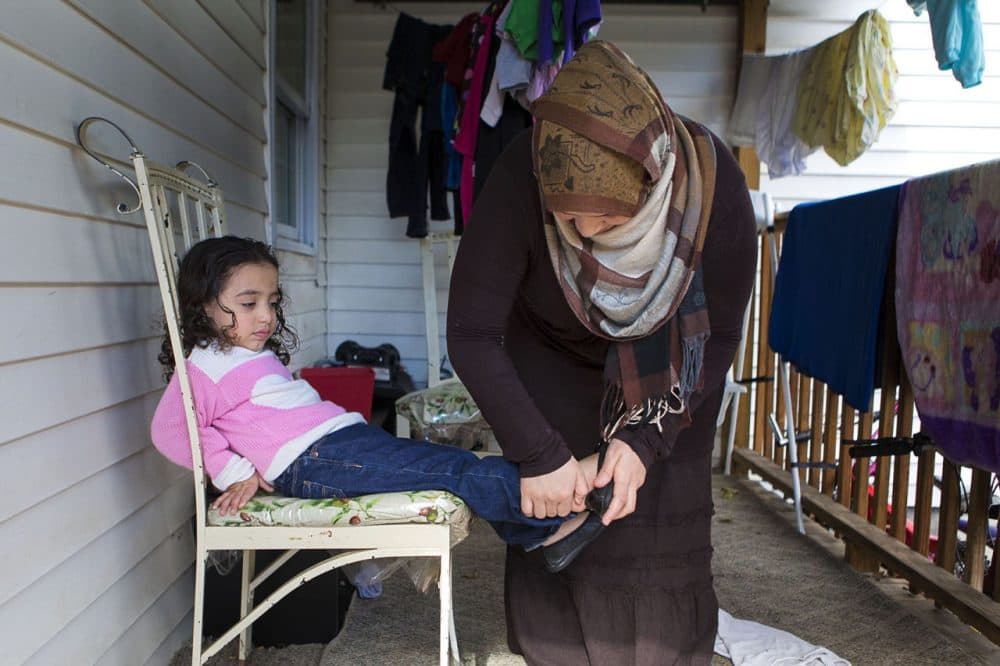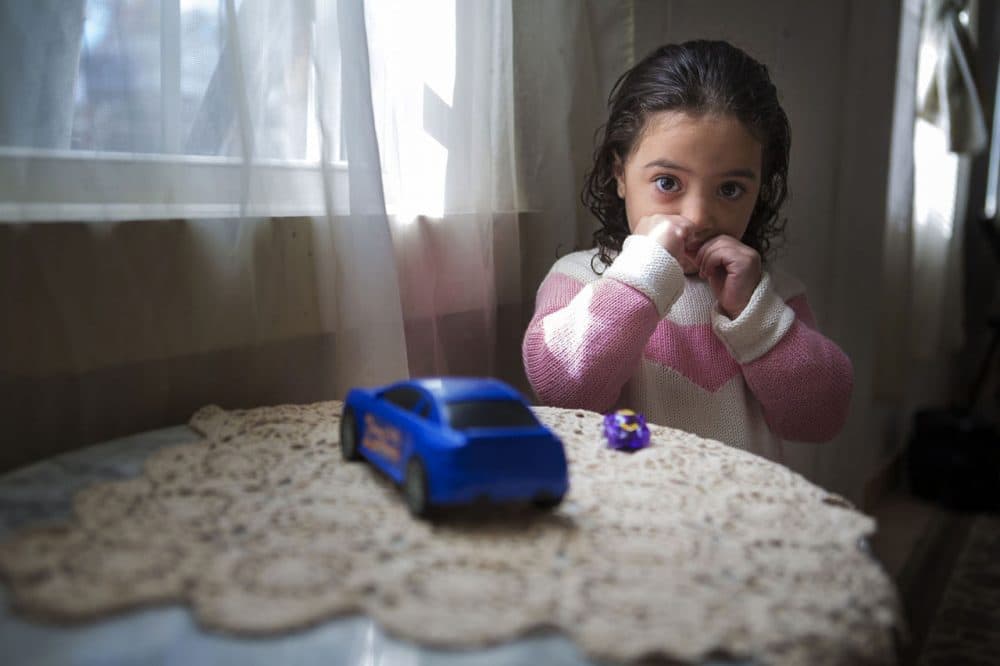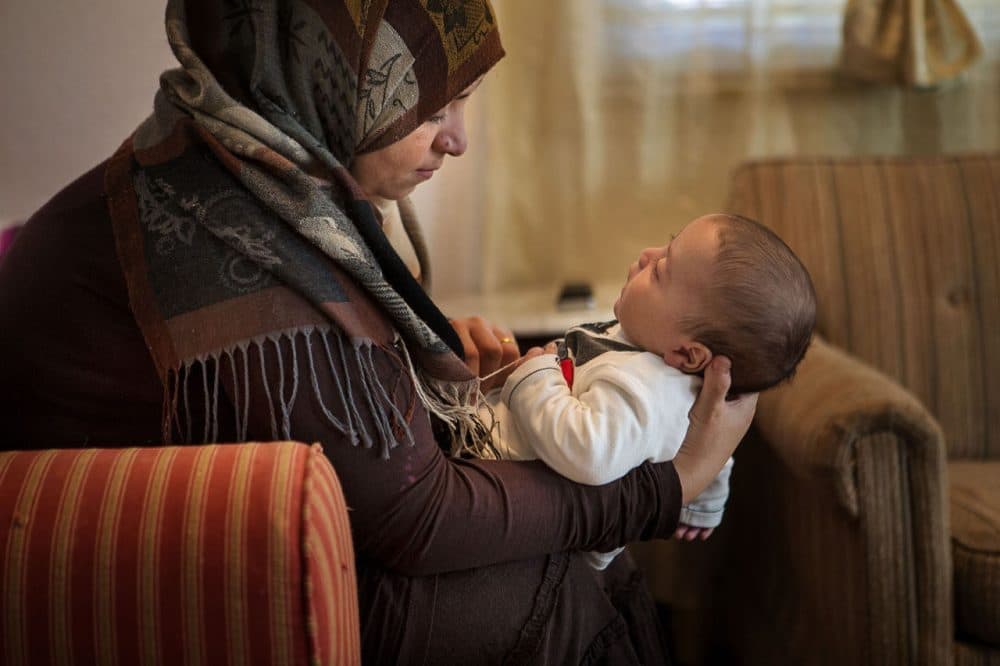Advertisement
'There's No Going Back': One Syrian Family's Journey To A New Home In Mass.
Resume
From the outside, it looks like any other well lived-in house. Loads of laundry hang on the porch to dry, and a child’s bike is in the yard.
But this home, in the western Massachusetts city of Westfield, tells a different story than most of the neighbors — the story of a 5,000-mile journey that made a world of difference for one family from Syria.
It's been a year since Zid Al-Nassar, his wife Zenab and their children were resettled as refugees in Massachusetts.
A patchwork of Persian rugs covers the linoleum floor in their house and a tapestry hangs in the living room, bearing the words of a traditional Muslim prayer thought to bring good luck and blessings to the home.
Sitting down around a folding table in the kitchen, Zid speaks with us through a translator. He recalls the exact day his family’s journey began — May 11, 2013, in his home city of Daraa, some 60 miles south of Damascus.
“I was in my shop and I just left to go somewhere else to get some stuffs, products,” he says. “There was a MiG aircraft … that aircraft attacked right in front of my shop and destroyed my shop. If I didn’t leave, the timing is 30 seconds between that attack and me being there. If I would’ve been there, I would’ve lost my life.”
His cellphone supply store was demolished by the bomb. The next morning, Zid decided it was time to get his family out of Syria.

‘It Was A Very Difficult Day’
Life had been good for the family. Between his shop and his shifts as a part-time taxi driver, Zid says he worked long hours and made a decent living. He says they were happy in Syria. But tensions had been growing ever since the Arab Spring protests reached Daraa in 2011.
“When the Arab Spring started in Egypt, youngsters tried to apply the same thing in Daraa, so they went outside to protest, not to the regime itself or trying to overthrow the regime, but they asked for corrections and they ask[ed] for improvement of services in life,” he explains. “The kids were tortured. They took some of their nails out and tried to torture them in prison. The Assad army started to attack the protesters, some people got killed, some people got injured. Things started to escalate.”
The family lived amid the unrest for more than two years. Zid says they grew accustomed to military aircraft flying overhead and the sound of artillery attacks off in the distance. But the day his shop was destroyed, the unrest suddenly became too close for comfort. Zid and his family packed only what they could carry and left the only home they’d ever known.
“It was a very difficult day when I decided to leave,” he tells us. “Even my wife Zenab asked me, ‘Where are we going?’ I told her, ‘I don’t know where we’re going, as long as we can find safe haven.' ”
Asked whether she was ready to leave Syria, Zenab pauses and covers her face with her hands. She whispers that she was not ready to leave, brushing tears from her eyes before she excuses herself from the table.
Both Zid and Zenab left without telling most of their extended family. Zenab didn’t have a chance to say goodbye to her mother.

‘There’s No Going Back’
With their four children in tow, they headed north for Lebanon. A week later, a humanitarian organization paid the family’s airfare to Egypt. They’d be in Egypt for a year while one of their sons received medical treatment for a chronic liver condition.
And, while in Egypt, they began the application for refugee status with the United Nations High Commission for Refugees, or UNHCR.
“At first, it didn’t cross my mind at all to come to the United States,” Zid says. “So when I went to the UNHCR to tell them, that ‘This is my son’s condition, I need medicine for him, what am I supposed to do?’ To me, my preference was anywhere.”
Zid says being resettled in the U.S. wasn’t necessarily a priority. He knew the process of being admitted into the country as refugees was difficult, and he was focused instead on finding medical treatment for his son, wherever that might be. “Any other country, as long as it’s a safe country to get to because, you know, there’s no going back,” he says.
A few months later, they got the news: They were going to the U.S. But not before each member of the family underwent numerous security checks, in-person interviews, medical screenings and cultural orientation.
Even then, they had no idea where in the U.S. they’d eventually call home.
Of the 12 million Syrians displaced by civil war since 2011, Zid, his wife and their children are among the fewer than 100 Syrian refugees who’ve been resettled in Massachusetts, and the first to be resettled in western Mass.
With an easy smile spreading across his face, Zid chuckles and says he knew nothing about Massachusetts or Westfield before they arrived.
“All I knew was America and that’s it," he says.

A New Home In Westfield
When Zid and his family arrived at Bradley International Airport in Hartford, they were greeted by members of the resettlement team from Worcester-based Ascentria Care Alliance, formerly known as Lutheran Social Services of New England.
Our translator, Mohammed Najeeb, is a program manager with Ascentria and for the last year has helped the Al-Nassar family adapt to their new community. Ascentria found the family housing and provided meals, clothing and toys for the children.
The family is adjusting.
“In Massachusetts, people are wonderful,” Zid says. “Besides the nature is beautiful here, the people are so beautiful as well. Wherever you go, you find the help that you’re looking for.”
The children are in school and Zid says they’re doing well and learning English. Zid is also learning English and recently landed his first job at a food processing plant in Turners Falls, which is about 40 miles away.
And yet, Zid says there’s something missing.
“Honestly, it’s my family that I want to be here. All the other belongings and the goods, I can find here,” he says.
Zenab’s experience has been a little different than the rest of the family. Loud noises can be frightening, reminding her of the war-torn homeland they fled. But recently, she began filling out paperwork, hoping to bring one of her brothers and her mother to Westfield.
And in August, on U.S. soil, the Al-Nassar family welcomed a new
baby son -- the first U.S. citizen among them.
This segment aired on November 4, 2015.

